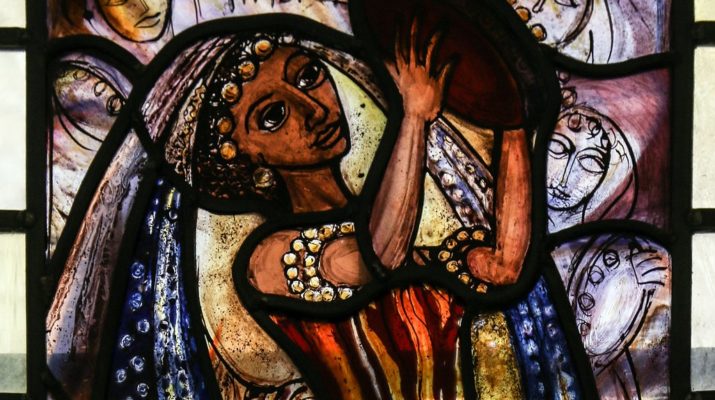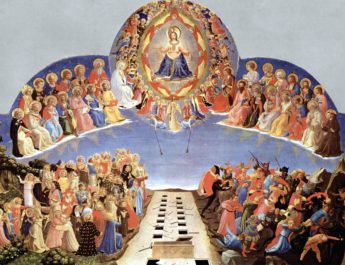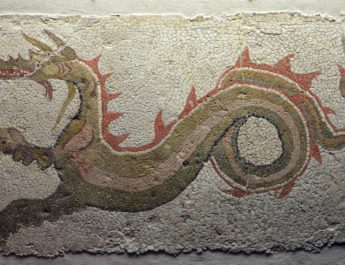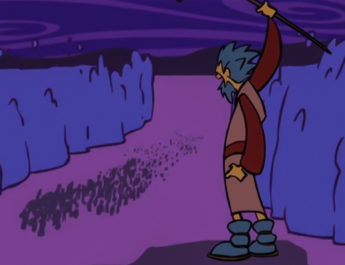Psalm 103:1-13
Ordinary A42
Of David.A
1 BlessB the Lord,C O my soul,D
and all that is withinE me,
bless his holyF name.G
A “David” = david. From the same as dod (beloved, love, uncle); the root may mean to boil, which is used figuratively to describe love. So, this implies someone you love such as a friend, a lover, or a close family member like an uncle. David’s name likely means something like “beloved one.”
B “bless” = barak. This is to kneel, to bless. It is blessing God as part of worship and adoration or blessing humans to help them. It can be used as a euphemism to say curse God.
C “Lord” = YHVH. From havah (to be, become) or hayah (to come to pass, become, be). This is the name of the God of Israel, the self-existent and eternal one, the tetragrammaton. This pronunciation has been lost to time so “Lord” is generally used in its place.
D “soul” = nephesh. Related to naphash (to refresh or be refreshed). This is soul, self, person, emotion. It is a breathing creature. Can also refer to appetites and desires.
E “within” = qereb. Perhaps from qarab (to come near or approach). This is among, in the midst, before, the center It is the inward part, whether literal or figurative. It can also be used for the heart, the site of thoughts and feelings. This word is also used as a technical term for the entrails of the animals who are sacrificed.
F “holy” = qodesh. This is set apart and so sacred. God is different from us and so God is holy/set apart. Things we dedicate to God’s service are set apart for God and so they, too, are holy, etc.
G “name” = shem. May be from sum (to put, place, set). This is name, fame, renown. A name was thought to indicate something essential about a person – something about their individuality. So, this word can also mean honor, authority, or character.
2 Bless the Lord, O my soul,
and do not forgetH all his benefitsI—
3 who forgivesJ all your iniquity,K
who healsL all your diseases,M
H “forget” = shakach. This is to forget or mislay – it is not knowing because of forgetfulness or inattentiveness.
I “benefits” = gemul. 19x in OT. From gamal (how one deals with someone whether positively or negatively – so to reward, requite; to wean or the work that goes into something ripening). This is benefit, deed, recompense. It is some treatment that is deserved or earned, whether positive or negative. It can be reward or requital.
J “forgives” = salach. This is to forgive, pardon, or spare.
K “iniquity” = avon. Perhaps related to avah (to bend, twist, be amiss). This is sin, mischief, guilt, fault, punishment for iniquity, or moral evil.
L “heals” = rapha. Properly, this is to repair by stitching – figuratively this means to heal or cure. It can also mean to make whole.
M “diseases” = tachalu. 5x in OT. From chala (to be sick). This is a sickness or pain. It can also refer to a beginning.
4 who redeemsN your lifeO from the Pit,P
who crownsQ you with steadfast loveR and mercy,S
N “redeems” = gaal. This is to redeem someone or something according to kinship laws. So, it could be acting on a relative’s behalf to buy back their property, to marry one’s brother’s widow, etc. This could be more briefly translated as to redeem, acts as kinsman, or purchase. As a noun, it could be deliverer or avenger.
O “life” = chay. From chayah (to live or keep alive literally or figuratively). This is alive, living, lifetime. It can also be used to describe someone’s age. It can refer to animals, plants, water, or a company or congregation of people. It is life in a very broad sense.
P “Pit” = shachath. From shuach (to bow or sink down in a literal or figurative sense, humble). This is ditch, trap, grave, or hole. Figuratively, it could be destruction or corruption.
Q “crowns” = atar. 7x in OT. To surround or encircle to defend, protect, or attack. It is crown in a literal or figurative sense.
R “steadfast love” = chesed. From chasad (being good, kind, merciful; may mean bowing one’s neck as is done in the presence of an equal for courtesy’s sake; so, if one in a superior position is treating you like an equal, that is what is captured here). This is favor, goodness, kindness, loving kindness, pity, reproach, or a good deed. When done by God to humanity, this is mercy/loving kindness. When done by humanity to God, it is piety.
S “mercy” = racham. From the same as rechem (womb); from racham (to love, have compassion, have mercy); from racham (compassion, tender love, womb, compassion; the womb as that which cherishes the fetus). This is compassion, mercy, or tender love.
5 who satisfiesT you with goodU as long as you liveV
so that your youthW is renewedX like the eagle’s.Y
T “satisfies” = saba. To be satisfied or full in a literal or figurative sense. Also, to have plenty of.
U “good” = tob. From tob (to be pleasing, to be good). This is good, beautiful, pleasant, agreeable, bountiful, at ease. This word is used for goodness as a concept, a good thing, a good person. This can refer to prosperity and welfare as well as joy, kindness, sweetness, and graciousness. So, this is ethically good, but also enjoyably good.
V “live” = adi. 13x in OT. From adah (adorning oneself with ornaments, decorate). This is decoration, beauty, jewels, ornaments, an outfit, something excellent.
W “youth” = naur. From naar (child or a servant; a child in their active years so they could be aged anywhere from infancy to adolescence); perhaps from naar (to shake, toss up and down, tumble around). This is youth or childhood.
X “renewed” = chadash. 10x in OT. This is to renew or restore, to repair or rebuild.
Y “eagle’s” = nesher. This is an eagle or vulture – some kind of large bird of prey. Its root may mean lacerate.
6 The Lord works vindicationZ
and justiceAA for all who are oppressed.BB
Z “vindication” = tsedaqah. From the same as tsedeq (rightness, righteousness, vindication. It is everything that is just or ethical. That which is right in a natural, moral, or legal sense. It also includes just weights (i.e. true weights). Figuratively, this is justice, righteousness, equity – even prosperity). This is righteousness, justice, righteous acts, and moral virtue.
AA “justice” = mishpat. From shaphat (to judge, defend, pronounce judgment, condemn, govern). This is a verdict or formal sentence whether from humans or from God. It includes the act of judging as well as the place that judging takes place, the suit itself, and the penalty. Abstractly, this is justice, which includes the rights of the participants.
BB “oppressed” = ashaq. This is to wrong, deceive, violate, or use oppression.
7 He made knownCC his waysDD to Moses,EE
his actsFF to the peopleGG of Israel.HH
CC “made known” = yada. This is to know, acknowledge, advise, answer, be aware, be acquainted with. Properly, this is to figure something out by seeing. It includes ideas of observation, recognition, and care about something. It can be used causatively for instruction, designation, and punishment.
DD “ways” = derek. From darak (to tread, march, to walk. Can also mean affixing a string to a box since one needs to step on it to bend it in the process; so also an archer). This is a road as a thing that is walked on. Can be used figuratively for the path that one’s life takes or how one chooses to live one’s life.
EE “Moses” = mosheh. From mashah (to pull out in a literal or figurative sense, to draw out) OR from Egyptian mes or mesu (child, son i.e. child of…). This is Moses – the one drawn out from the water, which is to say, rescued. If derived from the Egyptian, his name would share a root with Rameses and Thutmose.
FF “acts” = alilah. From alal (to affect, do, practice, mock, overdo, glean, abuse, pain). This is a deed or action – something that causes an effect. It could be a wanton or shameful deed or an opportunity.
GG “people” = ben. Literally “children.”
HH “Israel” = yisrael. From sarah (to persist, exert oneself, contend, persevere, wrestle, prevail) + el (God or god). This is God strives or one who strives with God; new name for Jacob and for his offspring. This refers to the people and to the land.
8 The Lord is mercifulII and gracious,JJ
slowKK to angerLL and aboundingMM in steadfast love.
II “merciful” = rachum. Related to “mercy” in v4. 13x in OT. From the same as rechem (womb); from racham (to love, have compassion, have mercy); from racham (compassion, tender love, womb, compassion; the womb as that which cherishes the fetus). This is compassionate or merciful.
JJ “gracious” = channun. 13x in OT. From chanan (beseech, show favor, be gracious; properly, to bend in kindness to someone with less status). This is gracious, compassionate, merciful, having pity on.
KK “slow” = arek. 15x in OT. From arak (to be long in a literal or figurative sense, to continue, defer, draw out, endure, delay). This is long, patience, or slow.
LL “anger” = aph. From anaph (to be angry; properly, breathing hard as a signifier of being enraged). This properly refers to the nose or nostril and by extension the face. It can specifically refer to anger or wrath as one breathes hard and nostrils flare in times of great anger.
MM “abounding” = rab. From rabab (increasing in any aspect whether quantity, authority, size, quality, greatness, etc.). This is abundance, many, elder, exceedingly, great. It refers to abundance of amount, rank, or status.
9 He will not alwaysNN accuse,OO
nor will he keepPP his anger forever.QQ
NN “always” = netsach. From natsach (something that glitters from a distance or stands out, excels, has status/standing; also to be permanent or enduring). This is properly a goal or destination as the bright focus to which one journeys. It can be splendor, truthfulness, or confidence. Most often, it refers to everlastingness, always, continually.
OO “accuse” = rib. This is properly to toss or grapple. It is used figuratively to mean wrangling and so for arguments, complaints, or disputes. It is used in a legal setting for pleading or defending a case.
PP “keep” = natar. 9x in OT. This is to guard, keep, reserve, take care of. Figuratively, it could be to keep a grudge or hold on to anger.
QQ “forever” = olam. This is a long scope of time whether in the past (antiquity, ancient time) or in the future (eternal, everlasting).
10 He does not deal with us according to our sins,RR
nor repaySS us according to our iniquities.
11 For as the heavensTT are highUU above the earth,
so greatVV is his steadfast love toward those who fearWW him;
RR “sins” = chet. From chata (to miss, sin, bear blame, to forfeit, lack). This is sin, fault, or punishment of sin.
SS “repay” = gamal. Related to “benefits” in v2. See note I above.
TT “heavens” = shamayim. Root may mean being lofty. This is sky, the air, or heaven. It is in a dual noun form so this might refer to the part of the sky where the clouds move on the one hand and the part beyond that where the sun, moon, and stars are on the other hand.
UU “are high” = gabahh. This is to soar or be lofty. So, this is to be high or lift up literally. Figuratively it means to be exalted or proud.
VV “great” = gabar. This is to be strong or mighty. It can mean to prevail or to be insolent.
WW “fear” = yare. From the same as yare (to fear, be afraid, dreadful; also fearful reverence – to fear in a moral sense is to say to revere, respect). This is fearful or morally reverent.
12 as far asXX the eastYY is from the west,ZZ
so far he removesAAA our transgressionsBBB from us.
13 As a father has compassionCCC for his children,
so the Lord has compassion for those who fear him.
XX “as far as” = rachaq. This is to widen, become distant, cast, or remove. It can be in a literal or figurative sense.
YY “east” = mizrach. From zarach (to rise, shine, or dawn; can also describe symptoms of leprosy). This is the east as the place where the sun rises. It can also refer to the sunrise itself.
ZZ “west” = maarab. 14x in OT. From the same as ereb (evening, night, twilight); perhaps from arab (to become dark or become evening). This is the west as the place where the sun sets. It can also refer to the setting itself.
AAA “removes” = rachaq. Same as “as far as” in v12. See note XX above.
BBB “transgressions” = pesha. From pasha (to rebel, offend, quarrel; making a break from proper authority so can also refer to an apostate). This is transgression, rebellion, or sin. It could be a revolt on a national scale or an individual moral one.
CCC “has compassion” = racham. Related to “mercy” in v4 & “merciful” in v8. From racham (see note S above). This is to love, fondle, have mercy, have or show compassion.
Image credit: “Prophet Miriam” by Pippa Blackall, 2008.




